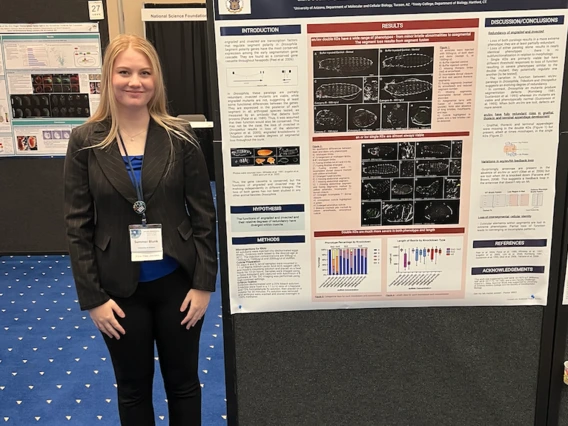Summer Blunk

Summer is a senior majoring in Molecular & Cellular Biology when she worked in Lisa Nagy's lab in the Molecular & Cellular Biology department.
Q: Describe the research you have been involved in.
A: I am in a developmental biology lab focused on the red flour beetle Tribolium Castaneum. We have a few projects but my main project is deciphering the functions of the two genes engrailed and invected. We have done this through knockdowns of the genes and phenotype analysis.
Q: What was the most new, frightening, or surprising part of this research experience?
A: I was very surprised at how much basic biology knowledge I would need for my day to day in the lab. Especially when it came down to understanding why we were doing specific things.
Q: What skills have you gained from this experience?
A: I have gained too many skills to count. My favorite skill gained is definitely statistical analysis and graphical output for our project but I have learned so many valuable bench top skills as well.
Q: How has your research experience benefitted you on an academic or professional level?
A: It has benefitted me because it solidified my choice to continue my career path into graduate school.
Q: How has your research experience benefitted you on a personal level?
A: It has given me a lot more confidence in my day-to-day life because I feel I know what I want to do with my future now. It has also given me lifelong connections and friends within my chosen field.
Q: What is one thing you wished you knew about undergraduate research before getting started?
A: You will 100% be asked questions you will not know the answer to. You should not be scared, everyone there is willing to help and you should take them up on their help and explanations.
Q: What advice would give other students wanting to get started in research?
A: Look at your colleges’ faculty page and check out their bios. Most of the time there will be a description of their research. If you think you would enjoy working in that research lab send them an email. The email should include a good amount of information about you and why you think you would be a good fit for the lab.
Q: What has been the best part of your research experience?
A: I was able to go to an international conference in Canada and share my research!
Q: What was the biggest challenge you faced with your research experience?
A: My biggest challenge in my experience was having to ask others for help and instruction because I did not understand the experiment.
Q: What are your future plans?
A: I will be applying this fall for PhD programs in biology.
Q: Is there anything else you would like to share?
A: Reach out to your professors. Even if you did poorly in the class ask them if they have a spot in their lab. They want to help and they love when students want to talk to them about their research.

